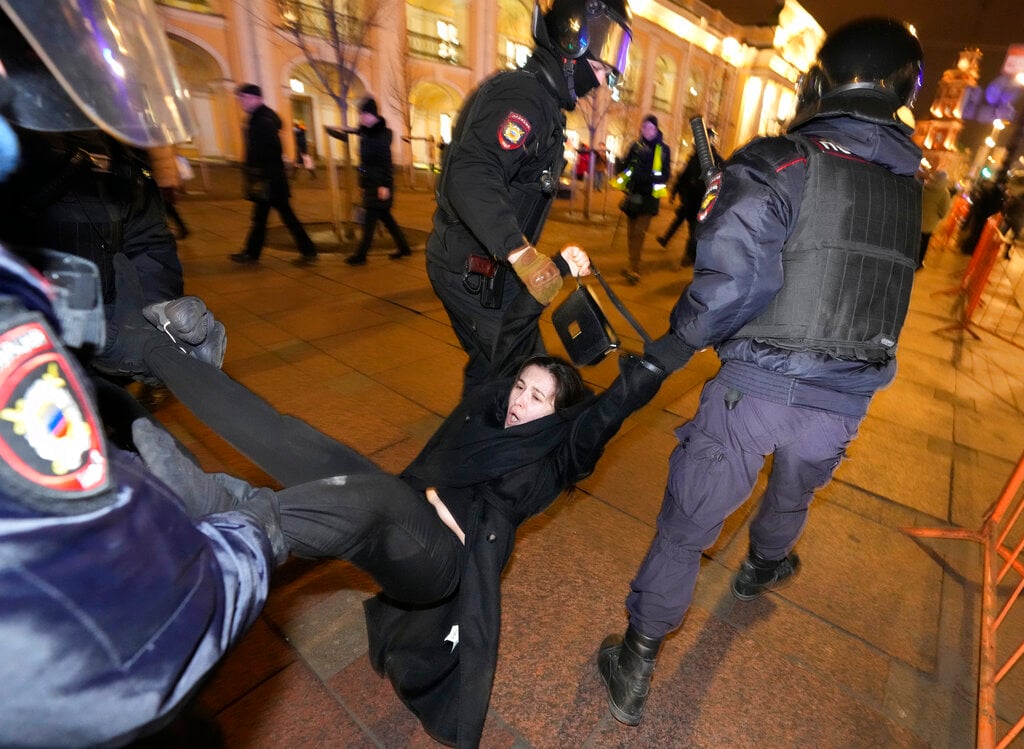Reportage
Jail for a flower, the struggle of Russian feminists
The most organized protest against the invasion is by the Feminist Resistance Against War (FAR). Their protests seem modest, but, with the new rules against contempt of the armed forces, you risk jail time for as little as a flower.

In Russia, the repressive terror is now coming down indiscriminately on intellectuals, leftist activists, and feminists. But it is a fact that the new laws are primarily affecting women.
The first person to be declared a “foreign agent” is a teacher from St. Petersburg named Daria Apakhonchich. Among the first victims of the “anti-fake news” law banning the dissemination of news that doesn’t conform to the official version is Vera Kotova, an anti-war activist from Krasnoyarsk, who was convicted of “contempt of the Russian army” for writing the words “No to war” in the snow.
Many famous journalists, artists and university professors are leaving the country. But, for ordinary feminist activists, this is not a viable option. They remain in Russia, exposed to the violence of their abusers, physically threatened by the police on one side and far-right militants on the other.
Eighty percent of those arrested in the March 8 demonstrations were women, as reported by Maria Kuvshinova, editor of the feminist magazine Kimkibabaduk. Kuvshinova has herself been bullied for her positions critical of the machismo of the film industry. The NGO Ovd-info confirmed her numbers: 25 of the 29 people brought to the Brateevo police station on March 8 were women.
The most organized resistance against the war in Russia has been the work of FAR (Feminist Resistance Against War) a group that brings together dozens of activists operating in 30 Russian cities. In a manifesto published on the first day of the conflict, FAR called for protests, for distributing information and for women around the world to join them. FAR is different from other pacifist organizations such as the Committee Against the War, which tend to bring together white liberal men based in London, Riga or Paris. Far less wealthy, with little resonance in Western media, feminist activists remain mostly anonymous to avoid retaliation, and while some have left Russia, most remain there, facing repression.
On International Women’s Day, when women in Russia, like in many other places, traditionally receive flowers, FAR organized a protest action that consisted of laying flowers and Ukrainian symbols in front of symbolic sites for the remembrance of the Great Patriotic War, turning them into memorials to the victims of the invasion. The places were carefully chosen: among others, the Stalinist mosaic of the Moscow Kyivskaya station and the Star of the Invasion Victims in Archangelsk. The protest seems modest, but, with the new rules against contempt of the armed forces, you risk jail time for as little as a flower.
Many militants had been already arrested beforehand. One of them told il manifesto: “I don’t have the strength to describe in detail how I lived through the five days of detention. The special forces came to get me, they knocked down the door, they confiscated all my electronic material, they took me away in handcuffs. I slept one night in a truck. Then at police headquarters, until my friends were able to get me out.”
Nevertheless, protests were organized across the country on March 8—and the police stations filled up with arrested women. The activist Anastasia Kaluzhskaya managed to record her violent interrogation. Anastasia was beaten and humiliated, called a whore and a traitor. Two other young women testified to the Mediazona journal that they had received the same treatment.
And repression doesn’t take place only through legal means. As early as the 1980s, the KGB used petty criminals to brutalize dissidents. Putin’s Russia has invented an updated version of this practice: “One day, out of the blue, I found insults and threats together with my home address on the far-right channel Bloodseeker,” Ksenia Bezdenezhnykh told us, a feminist from Socialist Alternative. “Shortly afterwards, I was all over the internet.”
Ksenia is one of the first victims of the terrifying practice of having a “Z” painted on her front door (see the article in il manifesto from 08/03/22): “Our addresses are known to the offices of Center E [the counter-terrorism department of the Ministry of the Interior],” says Ksenia. From there, they are transmitted to far-right activists who circulate them in their political and criminal circles. For months, she and her comrades from Socialist Alternative have been living with the terrible pressure of being under permanent threat.
Originally published at https://ilmanifesto.it/la-galera-per-un-fiore-lotta-delle-femministe-russe/ on 2022-03-12
